
table of contents
- Tall sour grasses / sour grass family (Cyperaceae)
- Types from A - Q
- Types from R - Z
- Grasses from the real or sweet grass family (Poaceae)
- Types from A - F
- Types of G - O
- Types of P - R
- Types from S - Z
- frequently asked Questions
Thanks to their imposing growth forms and striking colors, flowers or stalks, grasses are an important design element with high ornamental value. Tall grasses are the ideal privacy screen for a wide variety of areas in the garden.
In a nutshell
- Hardly any other group of plants is as diverse as ornamental grasses
- whether monochrome, striped, high or low
- can form up to 350 cm high privacy screens depending on the species
- Differentiation between sweet grasses and sour or sedge grasses
Tall sour grasses / sour grass family (Cyperaceae)
In this paragraph you will find some tall grasses in alphabetical order.
Types from A - Q
Rush Edge (Cladium mariscus)

- arching, sweeping, clumpy
- up to 180 cm tall
- upright stems, basal tuft of leaves
- Leaves gray-green, linear to linear-lanceolate, evergreen
- small light brown flowers from June to August
Common beach ledges (Bolboschoenus maritimus)

- deciduous, persistent, herbaceous, runners
- Heights of growth up to 120 cm, rarely 150 cm
- narrow, very upright to arched stalks
- triangular, leafy, rough above
- upper leaves green, lower leaves brown to black
- Flowering period June to August, partly until October
- reddish to black, egg-shaped to elongated flower spikes
Green pond rush (Schoenoplectus lacustris)
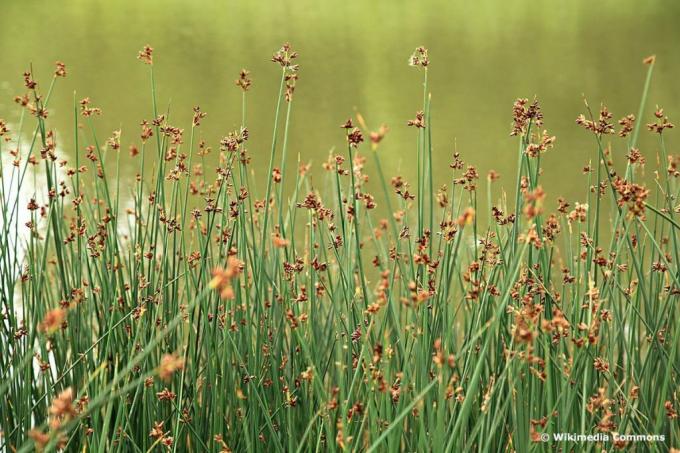
- fast-growing, sprawling, runners-forming, upright
- between 100 and 250 cm high
- Leaves green, pointed, bulrush to tubular
- blooms from June to August
- simple, brown, panicle-shaped flowers
- swampy to wet locations
Tip: The tall grasses of the pond rush are not only good privacy screens, but can also be used for water purification.
Types from R - Z
Giant sedge (Carex pendula)

- upright, overhanging, broadly bushy, clump-forming
- vigorous growth, hardy
- Heights of 100-120 cm
- Leaves dark green, belt-shaped to ribbon-shaped, shiny, pointed
- Flowering period June to July
Slender sedge (Carex acuta)
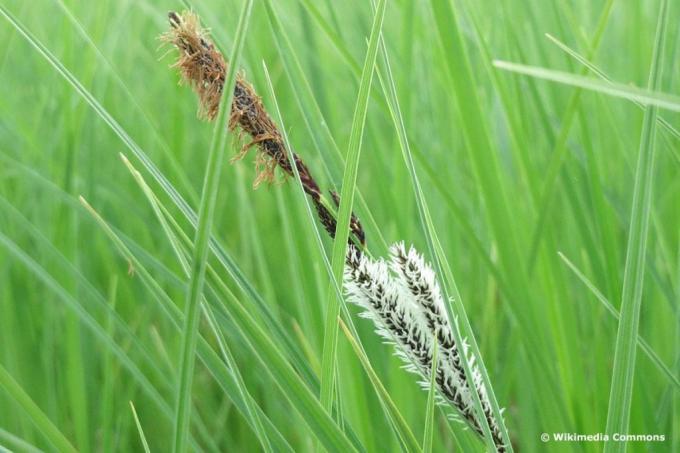
- perennial, herbaceous, runners-forming grass species,
- up to 150 cm tall
- green, belt- to ribbon-shaped leaves
- simple, greenish, spike-shaped flowers from April to June
- for swampy locations and water depths of up to 10 cm
Swamp sedge (Carex acutiformis)

- especially vigorous aquatic plant
- for water depths up to 10 cm and swampy locations
- Forming runners, arching, growing up to 120 cm tall
- grass-like, entire, pointed leaves
- from May to June upright, greenish, panicle-shaped inflorescences
Shore sedge (Carex riparia)
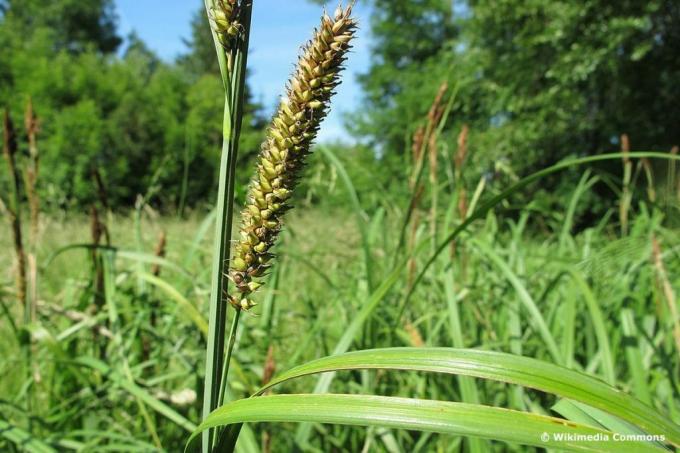
- different-year-old sedge
- up to 120 cm high, rarely up to 200 cm
- upright, sharp triangular stems, rough above
- gray-green, grass-like, rigid, pointed leaves
- black panicle-shaped inflorescences from May to June
- for standing and slowly flowing water
Grasses from the real or sweet grass family (Poaceae)
Also in the Sweet grass family there are some tall grasses that are perfect as privacy screens.
Types from A - F
Bearded grass 'prairie summer' (Andropogon gerardii)

- clumpy, arching, upright, basal tuft of leaves
- Heights of 140-160 cm
- brown-green, belt- to ribbon-shaped leaves, reddish-brown autumn color
- Flowering period August to September
- for dry to slightly damp locations
Bluish rod millet 'Heavy Metal' (Panicum virgatum)
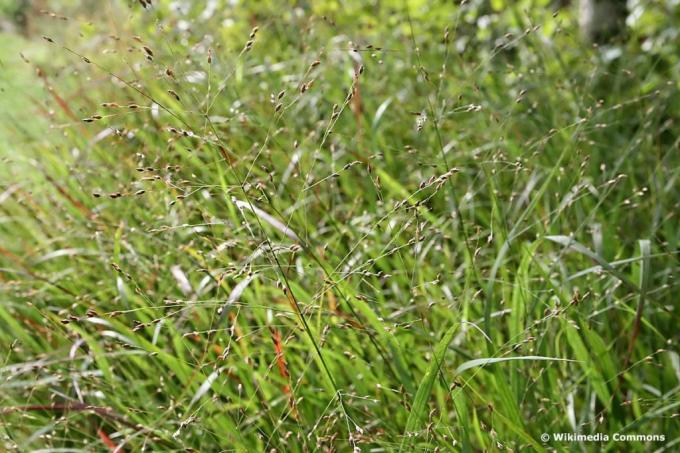
- stiffly upright, clump-forming growth
- up to 120 cm high
- attractive gray-blue foliage, yellow autumn colors
- dainty brownish panicles of flowers from July to September
- Cut back in spring
Broad-leaved cattail (Typha latifolia)
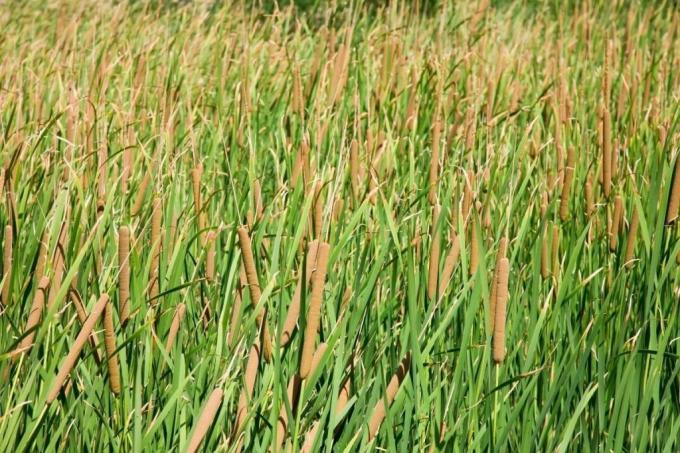
- imposing pond plant, 130-150 cm
- strong, upright growth, forming runners
- broad, belt-shaped to ribbon-shaped foliage
- Flowering period July to August
- showy inflorescences, black-brown cobs
Chinese reed 'Far East' (Miscanthus sinensis)

- Clumpy, upright growth, up to 160 cm tall
- green, belt-shaped, thin foliage
- intense reddish autumn color
- spike-shaped inflorescences from September to October
- initially brown, later silvery white
Chinese reed 'Federweißer' (Miscanthus sinensis)
- arching upright growth, up to 180 cm high
- medium green leaf color, belt-like, ribbon-shaped
- Flowering from the beginning of July to the end of October
- very loose, panicle-shaped, yellowish-white to brown inflorescences
- full sun, well frost hardy
Fine-stalked Chinese reed 'Gracillimus' (Miscanthus sinensis)
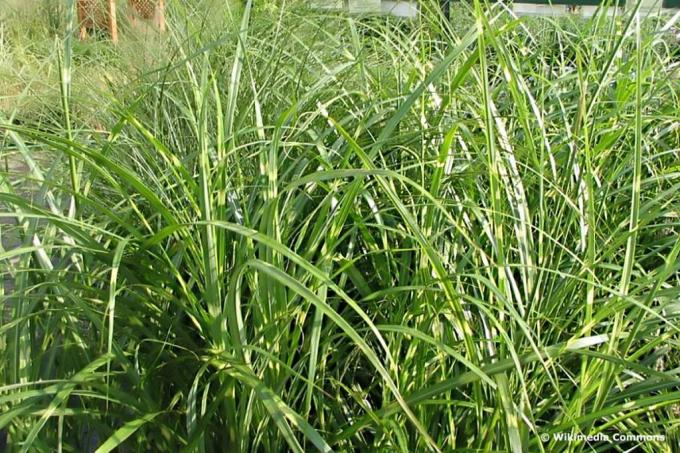
- upright, spreading, bushy, overhanging, clump-forming
- Heights of 130-150 cm
- green, grassy, narrow leaves
- blooms from September to October
- simple, spike-shaped, reddish or white-silvery flowers
- long lasting fruit decorations
Types of G - O
Garden bamboo 'Deichstrasse' (Fargesia murielae)
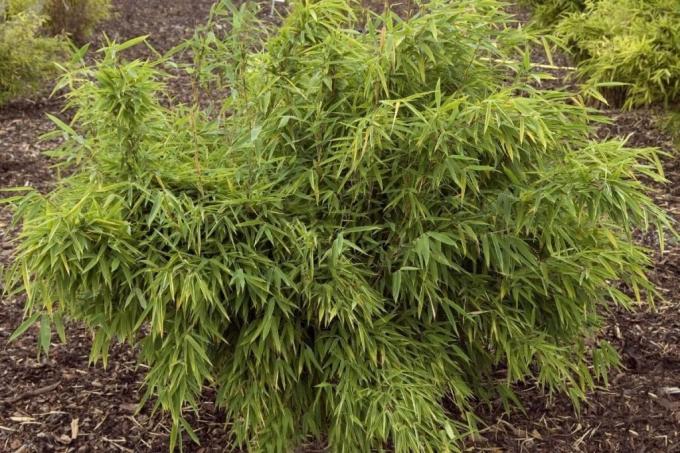
- upright growing species, 300-400 cm tall
- requires less space than overhanging varieties
- green, elongated, pointed leaves
- no flowers or fruit formation
- ideal location near water
Garden riding grass (Calamagrostis x acutiflora) 'Karl Foerster'

- upright and dense flower stalks
- between 100 and 150 cm high
- Flower formation from July to August
- simple, yellow-brown, narrow panicles
- no pruning in autumn
Common reed (Phragmites australis ssp. australis)
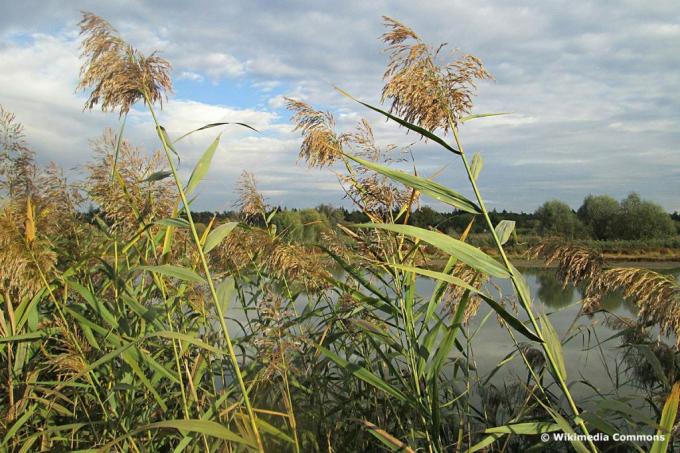
- vigorous, upright, rhizome-forming
- Heights of growth of 200-280 cm
- blue-green, narrow, ribbon-shaped, entire leaves
- blooms from August to September
- Flowers reddish-brown, panicle-shaped
- for water depths up to 80 cm
Tall Chinese reed (Miscanthus sinensis 'Silberfeder')
- broadly bushy, upright, forms dense clumps
- reaches heights of 200-220 cm
- Leaves arched, spreading
- simple, spike-shaped flowers from August to October
- initially reddish, later white-silvery
Types of P - R
Pampas grass (Cortaderia selloana)

- upright, arching, forms imposing clumps
- between 90 and 250 cm high
- greyish-green, belt- to ribbon-shaped leaves
- blooms from September to October
- simple, spike-shaped, silvery-white flowers
Pile tube (Arundo donax)

- reed-like, stiffly upright, arching inclined
- about 300-400 cm high
- yellow-green to gray-green, longitudinally striped leaves
- from July to August pale white, panicle-shaped inflorescences
- Winter protection recommended
Tip: Due to the strong urge to spread of these tall grasses, the introduction of a rhizome barrier is recommended.
Giant Chinese reed (Miscanthus giganteus)
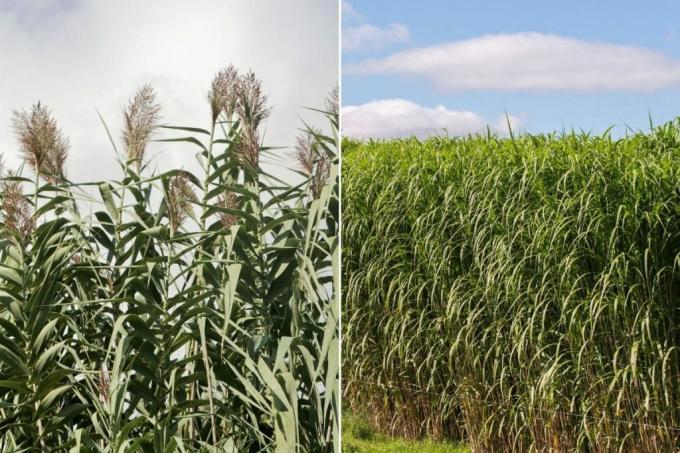
- impressive growth, perfect privacy protection
- optical highlight at the pond
- upright stalk, leaves arched at an angle
- Flowering period from September to October
- simple, spike-shaped, brownish inflorescences
Giant feather grass (Stipa gigantea)
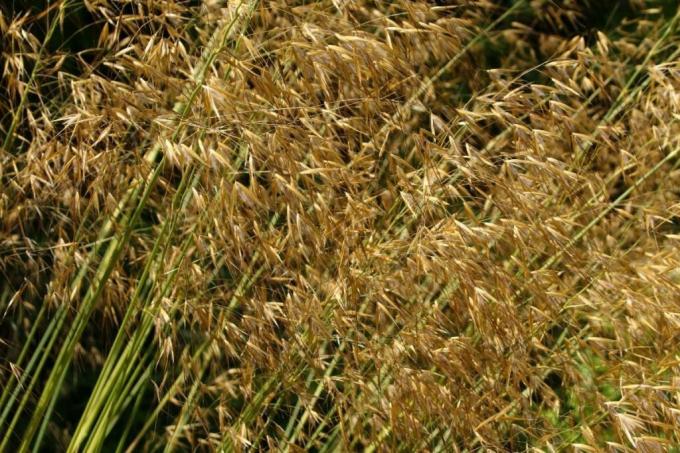
- upright, arched, dense clumps
- inflorescences from 150-180 cm high
- Leaf clusters up to 40 cm high
- grass-like, pointed gray-green leaves
- Inflorescences golden yellow, panicle-shaped, from June to August
- Fruit heads remain for a long time
Pipe pipe grass (Molinia arundinacea)
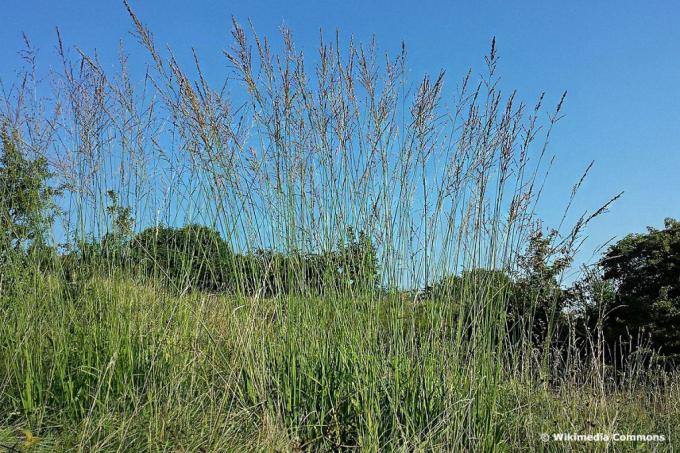
- Domestic grass, heights between 120 and 240 cm
- upright, clump-forming, tuft-like, upright stalks
- narrow, overhanging leaves that emerge late
- brown-yellow autumn color
- simple, yellowish-brown, panicle-shaped flowers from July to September
Types from S - Z
Columnar switchgrass 'Northwind' (Panicum virgatum)

- stiffly upright, clump-forming growth
- Heights of growth of 170-180 cm
- Leaves blue-green, linear, pointed, coarse
- yellow autumn colors
- from July to September brown panicle-shaped inflorescences
Silver flaggrass (Miscanthus sacchariflorus)
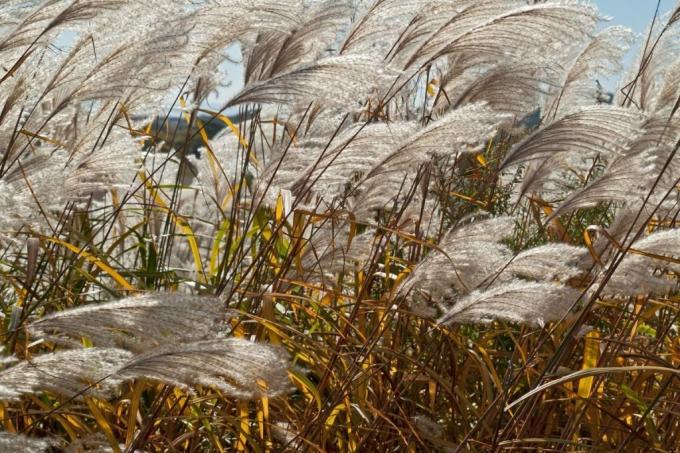
- upright, dense, rhizome-forming growth
- up to 130 cm, sometimes 170 cm high
- Leaves medium green, red-brown autumn colors
- from September to November silvery-white flower panicles
- Rhizome barrier recommended
Porcupine grass 'Strictus' (Miscanthus sinensis)
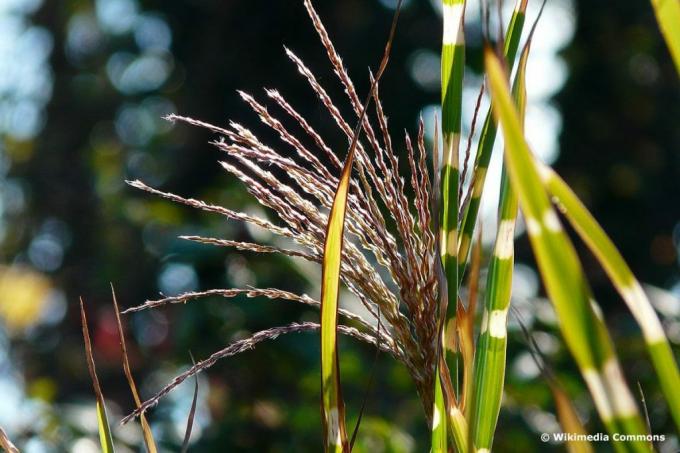
- tightly upright, forming dense clumps
- between 130 and 150 cm high
- transversely striped green-yellow, broadly linear leaves
- Horizontal stripes not yet visible when budding
- Flowers from September to October, brown, panicle-shaped
Firm millet 'Strictum' (Panicum virgatum)
- vigorous, compact, clumpy, up to 180 cm high
- upright, leafy flower stalks
- Leaves narrow, overhanging, linear, coarse, pointed
- blooms from July to September
- simple, brownish-green, panicle-shaped flowers
Zebra grass 'Zebrinus' (Miscanthus sinensis 'Zebrinus')

- Filigree look with a Far Eastern flair
- between 140 and 160 cm high
- Leaves with distinctive yellow or white horizontal stripes
- arched, shedding leaves
- Flowering period August to October
- does not bloom every year
- Flowers simple, spike-shaped, white-silvery
Tip: The zebra grass likes to stand by ponds. The tall grasses also come into their own in herbaceous borders.
Ornamental grass 'Indian Summer' (Miscanthus sinensis)
- very effective ornamental grass
- upright, arching overhanging, up to 15 cm high
- dark green-reddish summer foliage
- bright orange-red in autumn
- Delicately pinnate, creamy white fronds in summer
Villi ragweed 'West Lake' (Spodiopogon sibiricus)

- grows clumpy, bushy, upright, up to 150 cm high
- short green, bamboo-like leaves
- beautiful yellow and reddish autumn colors
- Flowering time from July to September
- filigree, purple-violet inflorescences
- fresh to moist locations
frequently asked Questions
While deciduous grasses should be cut back in early spring, evergreens are cut at the end of winter. You always cut back to the base.
They are best planted in spring or autumn. Basically, however, grasses can be planted all year round, provided the soil is frost-free.
The stalks of sour grasses are triangular, contain marrow and have no knots. On the other hand, they are round and hollow with knots in sweet grasses. While many sweet grasses belong to the forage grasses, this is not the case with sour grasses, they are predominantly representatives of swamp vegetation.
